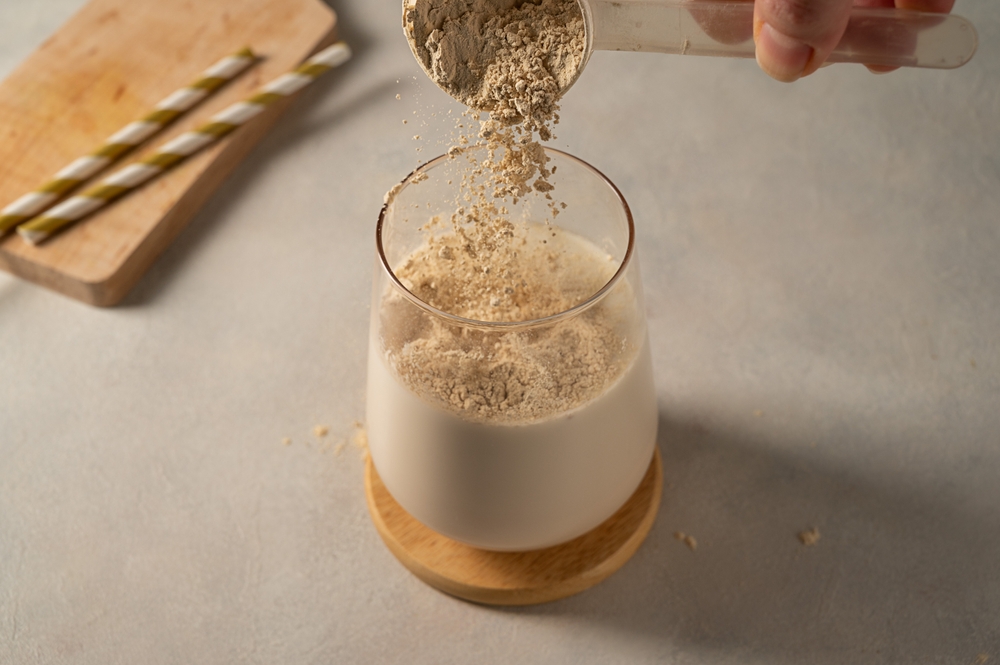Medical Weight Loss Protein Shakes: Benefits, Risks, and How to Use Them Safely
Protein shakes can play a big role in your medical weight loss plan. This guide will explain how medical weight loss protein shakes work, how they differ from regular protein supplements, which types of protein are most effective, and what risks you should be aware of. You'll also find guidance on how to use them to reach short-term fat loss and long-term weight management.
Protein Supplements vs. Medical Meal Replacements
There's a big difference between over-the-counter (OTC) protein powders, the ones you find at the store and the shakes used in a medical weight loss program.
Protein Supplements
Protein supplements available in stores or online are typically powders or ready-to-drink bottles designed to increase your protein intake. Their goal is to increase daily protein intake, mainly for muscle building, sports performance, or as a quick snack. While these can help you meet your protein goals, they are not made to replace full meals. Use them with caution, as they often lack vitamins, minerals, fiber, and a balanced mix of macronutrients.
Because they're sold as dietary supplements, they are not subject to strict regulation, which means their quality and safety can vary. You must be aware that if you replace too many meals with basic protein shakes, you risk nutrient deficiencies over time.
Medical Weight Loss Protein Shakes
Medical meal replacements are a different story. These shakes are designed to replace a full meal and meet all your nutritional needs. In one serving, they contain the right proportions of protein, carbs, fats, vitamins, minerals, and fiber. The fiber helps with digestion and keeps you feeling full, which is especially important when you're eating fewer calories overall. These products are often used in clinical settings for obesity management or in preparation for bariatric surgery. In both cases, nutrition and safety are closely monitored.
How Proteins Help with Weight Management?
Let's take a look at what it is about the proteins that make you lose weight. It's actually three processes that happen, and they are all intertwined.
Appetite Control
Have you ever eaten a big steak and noticed you weren't hungry for hours afterwards? This means you've experienced protein's natural appetite-suppressing effect. Compared to carbohydrates or fats, protein has a stronger influence on the hormones that signal feelings of fullness. Eating enough protein triggers the release of two hormones: GLP-1 and PYY. They are here to tell your brain you're full. At the same time, protein lowers ghrelin, which is the hormone that makes you feel hungry.
Research suggests that consuming more than 35 grams of protein in one meal is particularly effective for appetite control. In a medical weight loss program, this might mean a shake with 40 grams of protein taken at breakfast to help with the cravings for most of the day.
Higher Calorie Burn
Digesting food requires energy from your body. This concept is known as the thermic effect of food (TEF). Protein has the highest TEF of all macronutrients, meaning it needs a lot more energy from your body to process it than it would need to process carbs or fats. While the boost in calorie burn isn't huge, it's consistent. And over weeks and months, that extra energy usage makes the difference.
Preserving Muscle Mass
One of the biggest challenges when losing weight is protecting your lean muscle mass. Muscle tissue burns more calories at rest than fat, so keeping it is the key to maintaining a healthy metabolism. When you're in a calorie deficit, your body may break down both fat and muscle for energy, which you don't want to happen. Consuming enough protein gives your body the amino acids it needs to repair and maintain muscle tissue, even while losing weight.
A good medical weight loss shake doesn't just promote fat loss; it goes a step further by helping you ensure the weight you lose comes mostly from fat, not muscle.
Common Medical Weight Loss Program Approaches
Where do the medical weight loss protein shakes fit in the weight loss programs? They often combine different strategies depending on a patient's health, goals, and preferences.
1. Calorie-Controlled Plans
- Patients prepare and cook their meals using whole foods.
- Dietitians prepare the plan for each individual's specific needs.
- Regular check-ins with a doctor and a dietitian monitor progress.
2. Meal Replacement Plans
- You might replace some or all meals with medically formulated shakes.
- Partial plans combine shakes with healthy self-prepared meals.
- When we replace all meals with shakes and other vitamin/mineral supplements, we refer to it as a Very Low-Calorie Diet (VLCD).
- Used for rapid weight loss, often before surgery or for urgent health reasons.
3. Medication-Assisted Weight Loss
- Combines a calorie-controlled diet with prescription medications like GLP-1 agonists.
- Medications help reduce hunger and help patients stick to the low-calorie plan.
Best Protein Sources for Weight Loss Shakes
The type of protein in a shake affects three things:
- Digestion speed
- Amino acid profile
- Satiety
Whey Protein
Whey protein, derived from dairy, is a fast-digesting, complete protein containing all nine essential amino acids. It's especially effective after exercise, when your muscles are primed for repair. Many people also find whey shakes help curb hunger quickly. However, those with lactose intolerance may experience bloating or cramps unless they choose whey isolate, which contains less lactose.
Casein Protein
Casein protein is also dairy-based and complete, but it digests slowly. This makes it ideal for situations where you want to feel full for hours, such as between meals or before bed. Because casein releases amino acids gradually, it's also beneficial for overnight muscle repair.
Plant-based Proteins
Plant-based proteins include soy, pea, rice, and hemp. They are valuable options for people avoiding dairy. Soy is naturally complete, while others may be combined to cover all essential amino acids. Pea protein, in particular, has been demonstrated to help you feel full and keep your muscles strong. It digests faster than whey but slower than casein.
Short-Term Weight Loss vs. Long-Term Maintenance
Protein shakes can be effective tools for both quick results and ongoing weight control, but the strategies differ.
In the short term, medically supervised VLCDs with shakes can produce rapid fat loss. In the long run, eating more protein can help you keep the weight off by keeping your muscles strong and keeping your hunger in check. Many patients keep one shake a day for easier transition from meal replacements to whole foods.
However, studies show that VLCDs can occasionally make the brain more active when it sees food cues, which makes it harder to keep the weight off. Bariatric surgery, on the other hand, seems to lower these brain reactions, which could be why it has better long-term success rates.
Possible Downsides of High-Protein Diets
For most people, eating more protein is safe, but it can cause problems for people who already have some health concerns with their kidneys or liver. Protein makes these organs work harder, so anyone who has been diagnosed with an illness should talk to a doctor before making big changes to their diet.
Kidney stones can also happen with this kind of diet, with more acid in the kidneys because more calcium is released from bones and more calcium is lost in urine. This sets up the environment where kidney stones might form, particularly in people already prone to them. High purine content in some proteins can also raise uric acid levels, increasing the chance of uric acid stones.
Specific to protein shakes, digestive discomfort is common—especially with whey protein among those who are lactose intolerant. Switching to whey isolate or plant protein can resolve symptoms for many people.
Product quality is another concern. Because protein powders are regulated as dietary supplements, some might contain heavy metals, pesticides, or other contaminants. You can lower the risk by using brands that have been tested by a third party.
Lastly, if you rely too much on shakes instead of complete foods, you may not get enough nutrients, especially fiber. This can cause constipation and a lack of several vitamins and minerals.
Useful Tips for Using Medical Weight Loss Protein Shakes
If you want to add shakes to your plan, there are a few things you should do:
1. Talk to a doctor or other health professional first to be sure they meet your calorie needs and to check your overall health.
2. Choose smoothies that use whole proteins and provide you with a balanced diet.
3. Make sure to incorporate entire fruits, veggies, and healthy fats in your diet.
4. It's important you drink enough fluids.
5. Look for quality certificates on product labels.
Protein Shakes Should be Part of The Bigger Picture
When incorporated into your lifestyle and taken correctly, medical weight loss protein shakes can be quite helpful. They can help you manage your hunger, keep your muscles while you still lose weight, and make it simpler to stick to your calorie-restricted diet. But they work best when they are part of a full comprehensive plan that includes whole foods, changes to your lifestyle, and, if necessary, medical monitoring.
A shake can help you reach your goals, but drinking them is not the only thing you need to do. The best way to get long-term effects is to combine the appropriate diet with behaviors that last.
{{cta_small}}
FAQ
What’s the difference between regular protein shakes and medical weight loss protein shakes?
Regular protein shakes (often sold in stores or online) are designed to boost protein intake for muscle building or convenience snacks, but they don’t provide all essential nutrients. Medical weight loss protein shakes are formulated to replace an entire meal, containing the right balance of protein, carbs, fats, vitamins, minerals, and fiber. They are often used under medical supervision for safe, effective weight management.
How do medical weight loss protein shakes help with weight management?
They work in three main ways:
- Appetite control: Protein makes you feel full for a longer period of time and reduces hunger hormones.
- Higher calorie burn: Digesting protein requires more energy from your body than carbs or fats.
- Muscle preservation: The right protein intake protects muscle mass during calorie restriction, helping maintain a healthy metabolism.
Which protein type is best for medical weight loss shakes?
- Whey protein: Fast-digesting, complete amino acid intake, curbs hunger quickly.
- Casein protein: Slow-digesting, great for staying full longer.
- Plant-based proteins: Soy, pea, rice, and hemp are good dairy-free options; pea protein is especially filling and muscle-friendly.
The “best” choice depends on your digestion, allergies, and personal goals.








